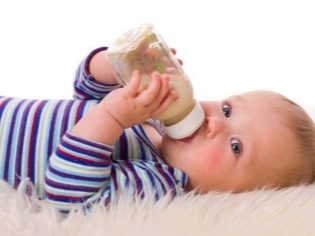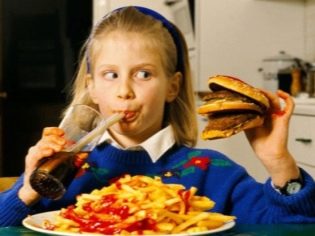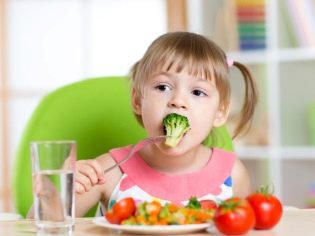Why does a child eat a lot and what to do?
Many parents dream that the child would eat with pleasure and not refuse the tasty and healthy dishes offered by parents. But sometimes moms and dads complain about the opposite situation - children eat too much, do not get saturated, do not feel the measure, satiety. Naturally, the question arises, with what it can be connected.
Why it happens?
The reasons for which the child eats a lot, and, as a result, heightens weight, can be different.
- Changed the type of feeding - the baby was transferred from breast milk to adapted milk formulas, completely replacing mother's milk with them.
- The presence of a child of parasites - with some parasitic infections, an increased appetite is observed, but with all the considerable mass of food eaten, the baby almost does not gain weight, and sometimes even begins to lose weight.
- Psychological destabilization, stress, severe mental and emotional stress - the beginning of a visit to the kindergarten, schooling, relocation or divorce of parents, a change in the climatic and time zone - stress can cause any change, any exit from the so-called “comfort zone”.
- The period of rehabilitation after an acute respiratory viral infection, flu or other infection that has visibly weakened the child’s immunity. The kid constantly wants to eat in accordance with the internal program of replenishment of energy reserves after a serious illness.
- Parental example and family eating behavior - A child eats all the time, in whose family there is a kind of food cult: mom “seizes” experiences, dad - stress after work day. The more food the parents consume and the more portions on the plates, the higher the likelihood that the child will show exactly the same feeding behavior almost from infancy.
- Diseases of the endocrine system, pathology of the gastrointestinal tract - because of them, the baby can eat a lot of sugar and sweets, and also constantly wants to drink. Food preferences can be any, for example, children with low acidity of gastric juice sometimes begin to eat a lot of apples or lemons.
- Wrong power mode - in 1.5 years the baby does not have enough three meals a day, as in 5 years, and where three meals a day are practiced, children more often experience physiological hunger and cannot reach satiety.
- Unbalanced, poor nutrition - the volume is sufficient, but there is a deficiency of vitamins, micro and macro elements. For this reason, the baby may experience constant hunger if the breast milk does not have the necessary fat, or the mother does not mix the mixture according to the instructions, too much, resulting in a watery diet that does not saturate the baby for long.
The pediatrician will help to establish the true cause. For this will be assigned to the survey, tests that tell whether the child has a pathology that can occur against the background of increased appetite.
What should parents do?
For a start, mom and dad need to stop encouraging such eating behavior. In practice, parents often take pride in the fact that their little tot eats far more than the norm, claiming that "a real hero grows." There is nothing bogatyrsky in the habit of eating more than the norm, and the habit of eating a lot of children and abundantly has absolutely nothing to do with the improvement of the children's body.
First of all, you should show the child to the doctor - pediatrician, do tests for eggs of the worm, donate blood for hormones and make a biochemical blood test, to determine whether the child has a deficiency of certain vitamins and nutrients. With a pathological background, the prescribed treatment helps to get rid of the problem, as the cause is eliminated, overeating goes by itself.
If there are no pathologies, the doctor will inquire about how much and how often the child eats, what is included in his diet.
Perhaps, if we are talking about a baby in 1 month, 3 months, etc., he does not ask at all, but to drink, and here the correct drinking regimen will help. Clean drinking water will help older children, it’s enough to offer a child to drink for 20 minutes before eating, and you will immediately notice that at dinner he eats a smaller portion than usual.
A child who is always hungry should not know what a snack is. Moreover, parents should exclude sweet snacks from cakes, sweets, and cookies. Only the main meals (5-6), in small portions, satisfying the needs for proteins, fats and carbohydrates, vitamins and minerals, and always at equal time intervals.
Famous pediatrician Yevgeny Komarovsky claims that more children eat, which during the meal with their mother contemplate TV. Therefore, there is a need only at the dinner table with the TVs and computers turned off. Nothing should distract the child from the process of absorbing food.
A child who has not reached the age of one should not have any meals in the daily ration, in which the caring hands of mother and grandmother added spices - and they, and salted-smoked products, substantially whet their appetite.
Escape from the hunger, which the child can complain between meals, will help active games, interesting activities - when the child is busy, usually he is not up to food. But if the child insists on eating, you can offer him vegetable juice or juice from unsweetened fruit, cooked at home on his own. Shop drinks from the boxes are rich in sugar, and nutritionists warn against their use, especially if the children have a good appetite and the baby is gaining weight.
Parents are a good example for a child. And because the constant snacks that are practiced by mom or father, are not the best example of eating behavior for a child. Other extremes - when an adult sleeps a lot and eats little, they can also cause eating disorders.
List of prohibited actions
Parents of a baby who eats a lot should remember once and for all that overeating is very dangerous, because it can lead to obesity, disruption of the functioning of internal organs and children's body systems, and therefore it is impossible to encourage excessive consumption of food. Parents of many years must remember that the child does not have a biological need after 6 months at night. Therefore, a child who asks for food at night needs to be able to say his parent “no.”
If a child eats a lot of bread or some other product, it is worth limiting its use, having first found out from the doctor what substance the baby may lack and what it can be compensated for in order to avoid "distortions" in the diet.
A child for good behavior, achievements and successes cannot be encouraged with chocolates and cakes, these products should not compensate for the lack of parental attention and love. From sweet develops a pretty strong addiction.
You should not try to "shut up" the child's mouth with food.
If a newborn cries at colic, a big parental mistake is to try to feed him out of schedule - the displaced baby doesn’t get rid of colic, but also regurgitates, which causes him additional discomfort.
Useful tips
Proper nutritional behavior in a child needs to be shaped. This is everyday parenting. And to make the child always eat in moderation and be healthy, will help a few simple tips.
- Feed your baby from birth to regime - what your regime will be like, it's up to you (after 2 hours, after 3 hours or 3.5 hours) - do it as it will be comfortable for your baby and for you. Having set the time period, do not change it.
- In the diet of a child who came out of infancy, must be present and meat, and fish, and dairy products, and cereals, and vegetables with fruits. But nuts, chips, crackers and other "delicacies" that parents give the child, sometimes even as a reward or gift, are unacceptable in principle.
- While eating, a child should not read books, magazines, watch a cartoon or news on TV - this leads to overeating in almost 100% of cases.
- Be more attentive to the child’s psychological experiences - be sensitive, ready to talk, talk, find the cause of his psychological and emotional discomfort at any time, and reduce mental loads if they are large. Do not let your child compensate for his lack of communication, impressions, fatigue.
- Visit a pediatrician in a timely manner, properly treat diseases of the gastrointestinal tract, helminthic invasions, do not practice self-treatment and treatment of the child with folk remedies.
In most cases, these measures help to avoid overeating. If the baby has already begun to eat a lot, it is important not to wait, but take timely measures to normalize eating behavior.
Read more about the problem of child overeating tells a specialist in the video below.





















